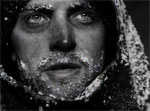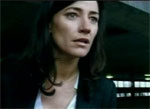IFTN talks to composer John Walsh about his latest project for Climate Change and his experience working on original scores for film, television and commercials.
With over 25 years experience working in the music industry John Walsh has been a professional composer for the past ten years. His commercial work includes television adverts for Guinness, Carlsberg, the Jameson International Dublin Film Festival, Vodafone and the Climate Change adverts, currently broadcasting on Irish television.
 Guinness Advert
Guinness Advert |
Walsh’s television drama credits include Subotica Entertainment’s ‘Proof’, BBC’s ‘Custer’s Last Standup’ and the documentary series ‘Rebellion 1798’; and he has created the title music for ‘The Premiership’, ‘The Six Nations’, ‘The World Cup’ and ‘The Olympic Games’. Having recently worked with upcoming directors such as Stephen St. Leger on his short film ‘Prey Alone’ and John Hayes’ ‘Venom’, the composer is looking to delve deeper into the areas of film scoring with a number of projects in the pipeline. Here we find out why and what makes the composer tick?
You’ve been working as a composer for over ten years now, how has the industry changed since that time?
I think the most significant change in the industry has come with technological advancements and new software. Before, we worked in a studio with lots of equipment and nowadays most people work in a virtual studio environment.
You can produce music with a laptop and a set of headphones and that’s something that gives composers a lot of freedom in terms of not having to be stationed in the one place, being able to travel and being able to sketch ideas. To finish something off to a highly produced level you would then take it into the studio for the final mix and mastering, but you could certainly travel and work on ideas in transit and that’s something that I’m very excited about and it certainly makes the work very exciting as well.
You do a range of musical scoring for film, television and advertising, is there any area you would like to work in next personally?
The thing I’m most passionate about is film and in that respect I enjoy working on commercials which have a cinematic quality to them. I’ve been very fortunate in that I’ve been asked to work on such campaigns because I would approach that commercial work in the same way as I would approach the scoring of a film.
Essentially what I am trying to do is stir people’s emotions and evoke a certain response. I would watch everything I possibly can and certain stuff I watch makes the hairs stand up on the back of my neck, I suppose the thing you are trying to achieve is that same reaction in other people.
I think your heart has to be very much in the right place in relation to the work and it has to have meaning. Music can be difficult in that it’s important to remain fresh, it’s important to still be excited and obviously there may be times when you are not as excited or you don’t feel as fresh towards it and that’s the time you need to walk away take break and maybe have a change of environment.
 The Premiership on RTE Two
The Premiership on RTE Two |
When you work on scoring a project, would you say you have a particular kind of signature style?
I would consider myself a bit of a hybrid animal. I think my personal preference would be orchestral music. However, it’s not enough to be an orchestral composer anymore and I think film has very much gone this way in the last ten years particularly with the advent of ‘Pulp Fiction’. It’s as important to produce a track that has a band feel or something that’s very ambient or uses contemporary sounds. You will find that directors want that as much as they want traditional orchestral score.
Often the preference is for a mixture of score and contemporary songs, and then sometimes the production company can’t afford to put those songs on the film so they might need a composer who can do both. I’ll give you an example, when I worked on ‘Proof’ it had a scored feel and then there were certain scenes set within a lap dancing club/ brothel where they had contemporary dance music. When they went to sell that programme abroad, they couldn’t use the commercial tracks they had licensed for Ireland, so I recreated those. It was two completely different approaches within one project.
Let’s talk about your latest commercial which was the Climate Change advert, currently showing on television. What was the brief you received for that and how did you interpret it into the music?
In relation to that brief, in relation to any brief, one thing that I find myself doing is almost trying to write a short story. You get a blank piece of paper and you write down the words that the client uses to describe the music and the pictures; Should it be serious or not? Should it be emotive? What tone are you trying to describe? What words and feelings?
Click play to view the Climage Change Advert
Untitled Document
|
Climate Change is a tricky one because it’s a serious issue, but to make it so serious and weighty for people would not be possible – we wanted it to have a positive aspect, a sense of optimism, but then again without it being too light or flippant. You try to find a place where the right tone is struck through the music and the pictures.
I started off on that piece with a very big orchestral sound with strings, drums, cellos and violins. So I had this massive sound and it just wasn’t working, and I made the decision to just strip it back to piano. That piano was one instrument within forty instruments and one of the things that happens with technology is that you’ve got all these tools there to throw everything in, including the kitchen sink. There are so many sounds at your disposal and it’s sometime hard to make that decision to pare it back. That comes with experience, less is more, that’s something I’m realising more and more and sometimes you have to be brave to make that choice – I’m not going to over produce it here or overcook it.
What inspired you to become a composer or make the transition from musician to composer?
Complete starvation! [laughs]
I was always going to work in music. I had my own band for years called the Fireflies and we released a couple of records in Ireland. At that stage I was 17/18 and I believed we were the best band in the world. I made a point of telling that to a lot of A&R people in the UK. [laughs].
It was an interesting time, we played in Europe and in venues around London but my interest always extended further than being a guitar player. I was very interested in what happened in the studio, not just writing pop songs but trying to write scores as well. After I came out of that band scene I went into music college with the Royal Irish Academy and I did a course with Trinity College London in Classical Guitar and Performance. I got into that for about eight years and all I wanted to be was a classical guitarist and somewhere along the line I just started writing tunes, just ideas, and I was handing it around to various sound studios in town.
At the time they were doing an opening sequence for the first night of TG4, it was the launch of the station, with Macnas the dance group and Mary Robinson was introducing it. The producers needed original music to make it work and they put it out to four or five different composers. So I put a pitch in and I got the job. That was my big break, with Dearbhla Walsh directing the piece. After that, Dearbhla was very good to me in terms of she went out of her way to promote me to other people. At that stage I was about 25.
How many instruments did you play then?
I played guitar, piano and string instruments and any key instrument. But I became a bit of a technical freak at the time, any bit of software I could get my hands on - like drum machines. I think that was the first time I realised what you could really do, what you might be capable of. So then I got the job of doing music for television and the next few years were a bit of a blur, I went from job to job constantly.
Would you say people who want to get into composing should get some kind of formal training?
I don’t think it’s necessary. I think the most important thing is instinct. I think you can learn how to play in many ways and you are going to be the best teacher for yourself. There’s so much information available now and you can find that information very easily. However, I think sometimes working in isolation can be difficult. The one thing that college does is surround you with other people, and that becomes a very positive stimulant.
How you learn to write music is just by listening to it and being a fan. I read music and I write music, but I don’t necessarily use that in terms of the work I do. I hear sound in my head and I use a dictaphone to record stuff. It comes down to having some kind of instinct.
Prince would be an example of someone who hasn’t had any formal training and he’s one of the greatest musicians today. If you take The Beatles, John Lennon was one of the greatest musicians in the world and he arranged beautiful stuff for strings and cellos - he never had any formal training.
For composing, do you think a technical or artistic mind is better?
I think a mixture of both is good. However, some of the most successful people working in the business today would be considered more technicians rather than anything else. Take someone like David Holmes as an example. He is one of the most successful Irish composers at the moment and he would be considered by many people to be a D.J.
What do you enjoy most about composing?
Probably my favourite part is meeting interesting people, particularly working with other musicians.
 Proof
Proof |
When you are given a project by a director, do you get to see visuals beforehand or do you go from a general brief?
I like the luxury of being given the visuals before a finished cut, that for me is the optimum situation. I think, in reality, what tends to happen is you work in tandem with the editor. While they are cutting you feed the editor some music and then he feeds you back some rough cuts.
What influences do you draw from in creating your work? Like, say if you were doing a drama would you look at a lot of dramas or if you’re scoring a romantic comedy, would you watch a lot of rom-coms?
Maybe I should be watching romantic comedies, maybe it would make for a more relaxing life! I’m watching too many thrillers! [laughs] It’s funny because comedy is possibly one of the most difficult things to do. In some ways it is easier to be dark and interesting.
I remember reading an interview with Harry Gregson Williams and he was talking about working on the second Bridget Jones movie. His work up until then was very dark and boisterous, kind of action movies stuff. He takes this project on thinking it will be an easy job, but he thought it was one if the most difficult things he had to do - to be light and whimsical, but not too much.
You watch everything you can, you will not like some stuff and you will hate some stuff and you will love other stuff. I suppose the point to make of all of this here is that opinions in relation to music, as indeed any art form, are subjective.
When you say you watch everything, would you watch old movies and then new work that’s being done?
In terms of old stuff, you always find yourself going back to Hitchcock movies because you’ve got Bernard Herrmann. His last film was Taxi Driver and he passed away just after he scored that one. It‘s funny, he remains timeless and you can pretty much reference everything you hear both in Hollywood film and foreign films towards someone like Bernard Herrmann because he created a precedence. Before he started scoring those films, films weren’t scored. The score didn’t exist in the way it did now and it was like film was two dimensional up to that point. He wanted to add this third dimension, he sort of told you this is how you should feel; when to feel scared; when to feel sad. All these people like John Williams and Danny Elfman would have borrowed a huge amount from him.
In terms of new stuff, one of the nicest scores I heard in the last few years was Alejandro Amenábar for The Others, and he also did The Sea Inside. He writes the score himself, directs the film and writes the screenplay.
What advice would you offer someone who is thinking of becoming a composer?
I guess you can’t give people advice really; people find their own way so you should just get out there and do it.
Actually, here’s a piece of advice that I’d give them. I think, if your focus all the time is about looking for gratification from other people, or looking for some sort of glory, or some sort of reward that comes from outside, you could be disappointed. You must do this from an internal perspective; you create music for your own satisfaction and the satisfaction you get from just playing or making music. Any outside reward is a bonus rather than an actual focus.
You have to say, “this is what I am, this is what I do regardless of whatever happens.” For me, Glen Hansard is a good example of this. I would whole heartily believe he was always going to be making music - that guy will be writing songs until he’s Keith Richard’s age, like he has been for the last 15/20 years. I know he certainly wasn’t doing it for an Oscar. I think if you decide that this is what I am; I’m a musician; writer; artist; it’s like you’re on a sort of journey. You do the best work you can and that will reward you.
What’s your next project?
I am currently working on music for an anti-terrorism campaign which will broadcast in Iraq. I am also working on theme ideas for a couple of feature films which are currently in development and are due to shoot next year.
What ambitions do you have now ten years into the business?
Film is really it - and to remain upright. But yeah, film is where my heart lies.
